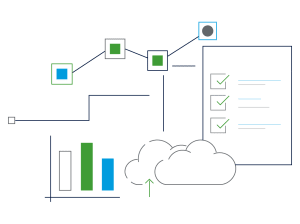This article answers the following questions:
- When should an inventory be carried out?
- What are the three most commonly used forms of inventory?
- How to determine the actual status of asset components?
Inventory is not only an obligation arising from the Accounting Act – it is also a key element of managing a company’s assets. How should this procedure be performed in a way that is both compliant with current Polish regulations and brings tangible benefits to the organisation? Let us take a closer look at the methods of conducting inventory and the most important related concepts.
How to conduct inventory in compliance with current regulations?
The three main methods of inventory most commonly used are:
- physical stocktaking combined with valuation of asset components, followed by comparison of their value with accounting records – any discrepancies must be explained and settled. This method applies to the following asset components:
- cash assets,
- physical securities,
- tangible current assets,
- fixed assets,
- real estate classified as investments, as well as
- machinery and equipment included in fixed assets under construction.
- obtaining balance confirmations from banks and confirmations from counterparties regarding the accuracy of the reported asset status, followed by verification against accounting records – as with physical stocktaking, any discrepancies must be explained and settled. This method covers:
- financial assets held in bank accounts or by other entities,
- dematerialised securities (company shares, bonds, investment certificates),
- receivables, including loans granted,
- own assets entrusted to counterparties.
- comparing accounting records with relevant documents and verifying their consistency with the books – this method is used for those asset components that cannot be inventoried physically or confirmed externally (with banks or counterparties). It applies to:
- fixed assets with significantly restricted access,
- and and property rights,
- disputed and doubtful receivables,
- receivables and liabilities towards individuals not keeping accounting records,
- assets arising from public-law obligations,
- other assets and liabilities not listed above, as well as those mentioned if physical stocktaking or confirmation was not possible.
Find out how we can support your business
What is needed for proper inventory? Key dates, exceptions and obligations
According to current regulations, inventory of a company’s assets should be carried out on the last day of the financial year. At the same time, the Accounting Act recognises that this deadline is met if the entity’s assets (excluding cash and securities) are inventoried no earlier than three months before the end of the financial year and no later than the 15th day of the following year.
How to determine the actual status of assets?
The status of asset components is determined by:
- physical stocktaking,
- balance confirmation and consideration of inflows and outflows (increases and decreases) that occurred between the date of stocktaking or confirmation and the date of determining the accounting status.
It is important to note that the status resulting from accounting records cannot be established after the balance sheet date. However, certain groups of assets are subject to exceptions to this rule.
What exceptions to the general inventory rule does the act allow?
For selected groups of an entity’s assets, the regulations allow exceptions:
- for inventories of materials, goods, finished products and semi-finished products in secured warehouses, covered by quantity-and-value records – inventory may be carried out once every two years,
- for real estate, investments and other fixed assets located in secured areas, such as machinery and equipment included in fixed assets under construction – inventory may be carried out once every four years,
- for inventories of goods and materials (packaging) covered by value records at retail outlets – inventory may be carried out once a year,
- for timber inventories in entities engaged in forestry – inventory may be carried out once a year.
All inventory discrepancies between the actual status and the status shown in the accounting records must be explained and recorded in the books in the year in which the inventory was conducted. Consequently, documentation of the inventory and its results should be clearly linked to accounting records. It must be kept for at least five years, counting from the beginning of the year following the financial year, after approval of financial statements.
It should also be emphasised that, under the Accounting Act, the head of the entity (usually the management board) is obliged to conclude an agreement with an entity authorised to audit financial statements for an audit or review of the financial statements in time to enable the auditor to participate in the inventory of significant asset components. Early autumn is the best time to contact your auditor or select a new one.








